Quick View of Doki Doki Literature Club Plus!
Game: Doki Doki Literature Club Plus!
Release Date: June 30, 2021
Price: $14.99
Rating: Mature
Platform: PS4, PS5 (Reviewed), Switch, Steam, Epic Games
Estimated Completion Time (Main Game + Side Stories): 8 hours
Disclaimer: A review code was kindly provided by publisher Serenity Forge
Welcome to the Club!
Upon starting Doki Doki Literature Club Plus!, you are greeted by a content warning. “This game is not suitable for children or those who are easily disturbed.” The ominous words are sharply contrasted by a pink polka-dotted text box.
Having played the original release of Doki Doki Literature Club!, which was released as “freeware” by Team Salvato in 2017, I can affirm how necessary this warning is. Unfortunately, however, it also reveals the subversive nature of the game up front.
Between the warning screen and the game’s Mature ESRB rating (for blood, violence, strong language, and suggestive themes), DDLCP makes it obvious that it is not the cheerful game about wooing cute anime girls that its art suggests. The game’s own website invites you to “Enter the #1 Psychological Horror Experience,” but even that doesn’t quite convey the game’s unique tone and purpose.
A Twisted Love Letter to Dating Sims
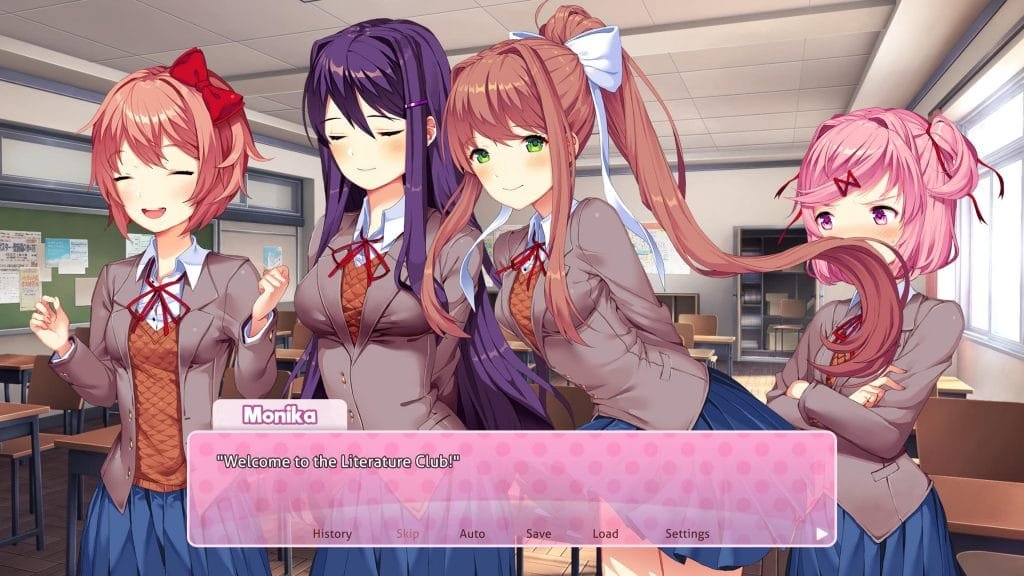
DDLCP is a deconstruction of the Visual Novel genre, which has enjoyed huge success in Japan for decades. Best exemplified by the Tokimeki Memorial series, most Japanese dating sims put you in the shoes of a male high school student who attempts to date an assortment of female students. By giving the girls presents and answering questions to their liking, you strengthen your bond with them.
The core of dating sims has mostly remained the same over the years, but aspects of the genre have snuck their way into more mainstream games such as the Persona series.
But enough with the preamble. While the original release is relatively well-known at this point, the “Plus” version introduces the game to a brand new audience of console owners. If you couldn’t gather already, the less that you know about the game going in, the better. Take the plunge and go in completely blind if at all possible!
The Story on Paper
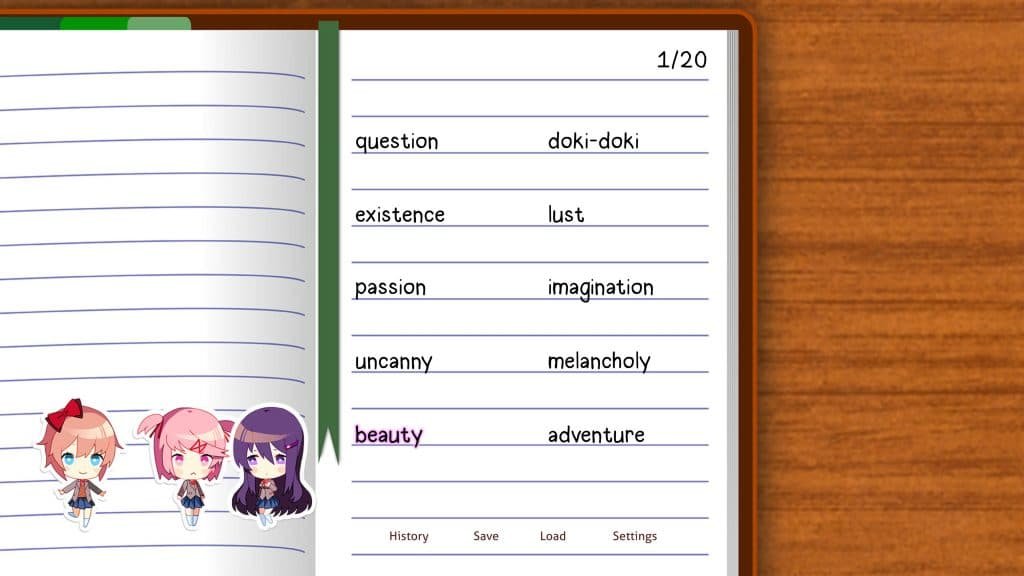
Things start out innocently enough. You are a male high school student who is coerced into joining a literature club by your childhood friend, Sayori. As the sole male representative of the five-member club, you take advantage of the opportunity to get closer to the four girls in the hopes of sparking at least one romantic connection. Aside from sweet-yet-lazy Sayori, there is the standoffish Natsuki, the intellectual Yuri, and the seemingly perfect club president, Monika.
The club’s first group activity is to write and share poetry as an opportunity to study different writing styles and means of emotional expression. You choose various words in a minigame to determine the tone of your poem. If the overall tone appeals to a particular girl, you unlock a one-on-one scene with her. The structure works very well with the dating sim template and lets you get to know the girls' personalities better.
Things get complicated when they begin to open up to you emotionally, however. DDLCP examines themes of identity and mental illness in a frank manner that may be off-putting to some. A second opening disclaimer warns individuals who suffer from anxiety or depression that they may not have a positive experience with the game.
As someone in the latter group, I can say that the game hits very hard at times. It’s unusual to see such a raw and up-front portrayal of mental illness in a game like this, but it’s handled with maturity for the most part.
How is it a Horror Game?
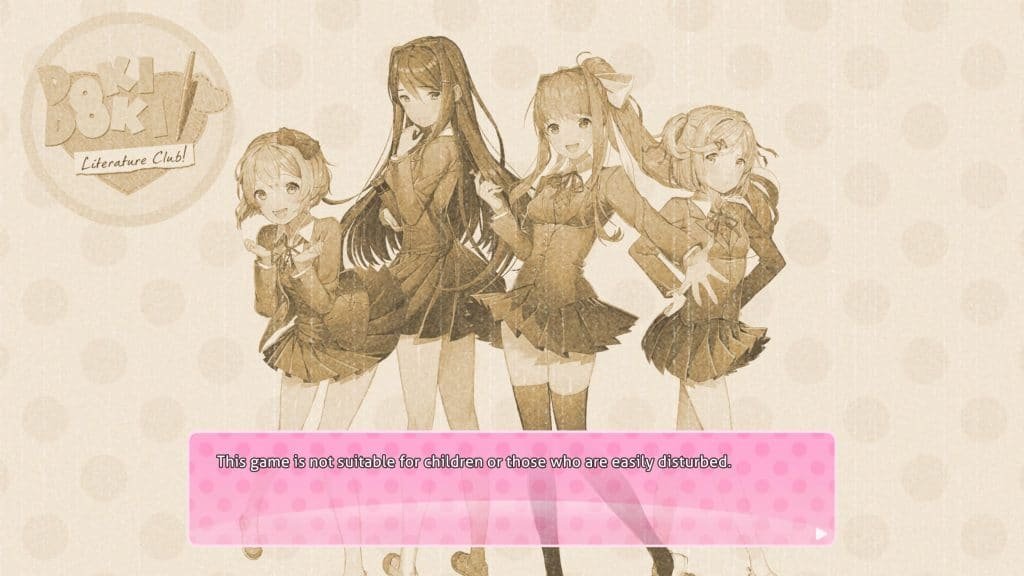
Let’s circle back to the “psychological horror” label that has been prominently used in DDLCP’s marketing. The moments that lean toward horror are undeniably effective on both a visceral and deeper psychological level. Even some of the fourth-wall-breaking dialogue, which is delivered with a cute wink and smile early on, becomes sinister and threatening as the story progresses. To say more than that would be a disservice to anyone who hasn't experienced the story. Suffice to say, the game will get under your skin.
In its attempt to dissect dating sim tropes, DDLCP gleefully turns any preconceived notions rooted in genre familiarity on their head. While there are a handful of truly shocking moments, there is also a surprising amount of dark humor. These moments lead to a unique combination of reactionary gasps and chuckles. As things become more and more bleak and chaotic, the narrative maintains its vicelike grasp. It compels you to pull back layer after layer of meta-commentary until the game ends or you are emotionally exhausted. The latter will likely occur first.
What’s New In Plus?
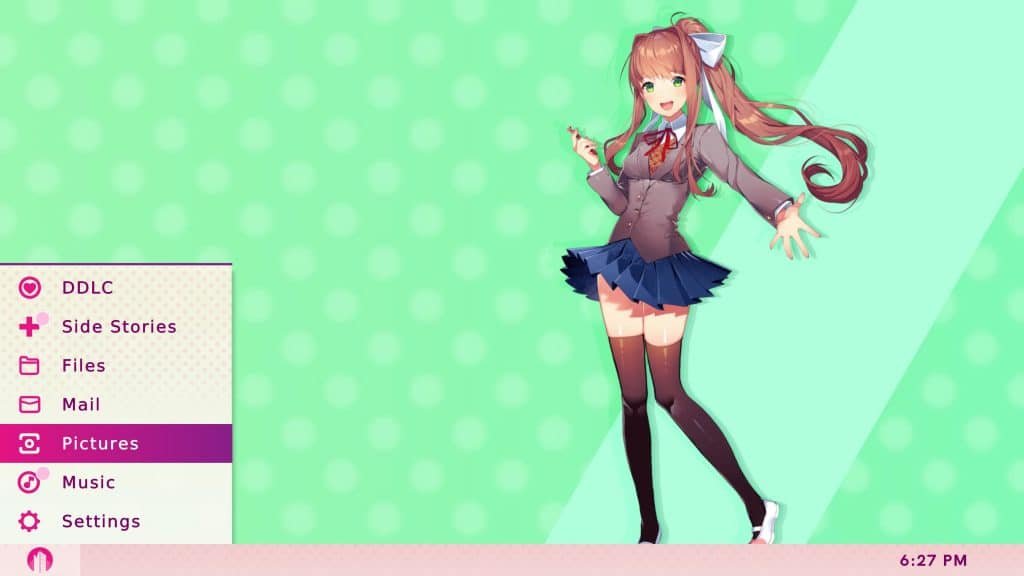
DDLCP isn’t just a simple port of the PC original. The most notable addition is a collection of six side stories that focus on the members of the Literature Club and their relationships with one another. I was a bit skeptical about these side stories and how they would impact the main story. My concerns were thankfully unfounded. Characters are fleshed out in a way that adds significantly to the emotional content of the game. That being said, I would still recommend playing through the core game before sampling any of the bonus content.
An art gallery and music playlist are also new additions that are available through an in-game virtual desktop. The gallery allows you to revisit poems and event pictures after “unlocking” them in the main game. It also has a collection of unique character art that can be used as wallpaper for the virtual desktop. These extras are far from essential, but a nice touch in addition to the robust side stories.
Visuals, Music, and Presentation
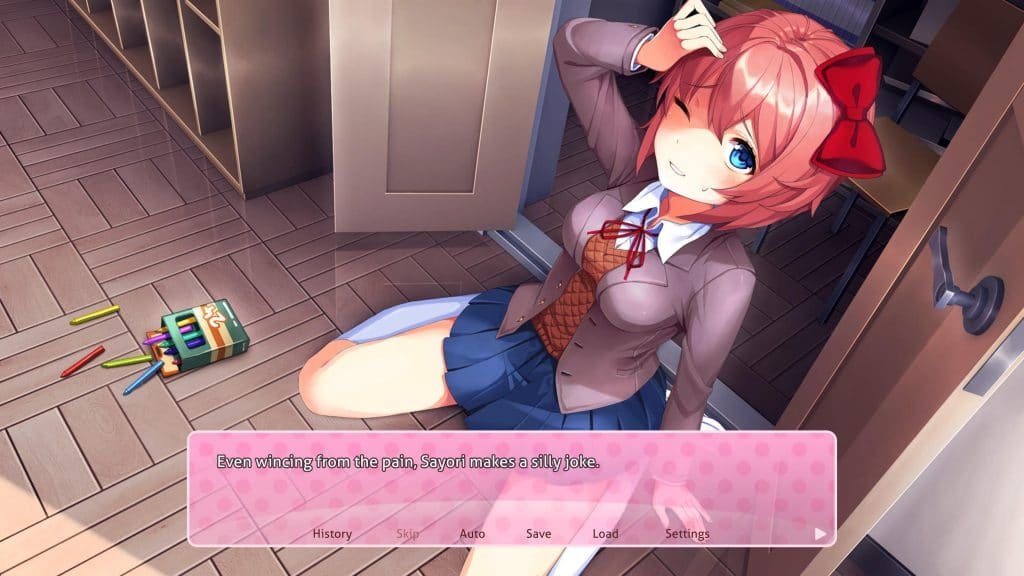
DDLCP has art and music that rival some of the better offerings of the genre it so effectively satirizes. Character art is clean and detailed, with smart little touches that symbolize aspects of the girls’ personalities. The overall presentation is bright and bubbly, and generally drenched in the color pink. Flourishes like animated chibi models of the girls that hop around as you select words for your poem also really add to the game’s charm.
The core game’s handful of musical tracks are exceptionally composed. Each track is catchy and upbeat, and I especially like how it subtly shifts when reading a girl’s poem to find a way to match their personality. The way the cheery piano theme playfully trips over itself belies the game’s willingness to venture into extremely dark territory, and the music becomes appropriately nightmarish when those shifts occur. New tracks and remixes have also been added for the Plus! release and are mostly featured in the optional side stories.
Definitely A Club Worth Joining
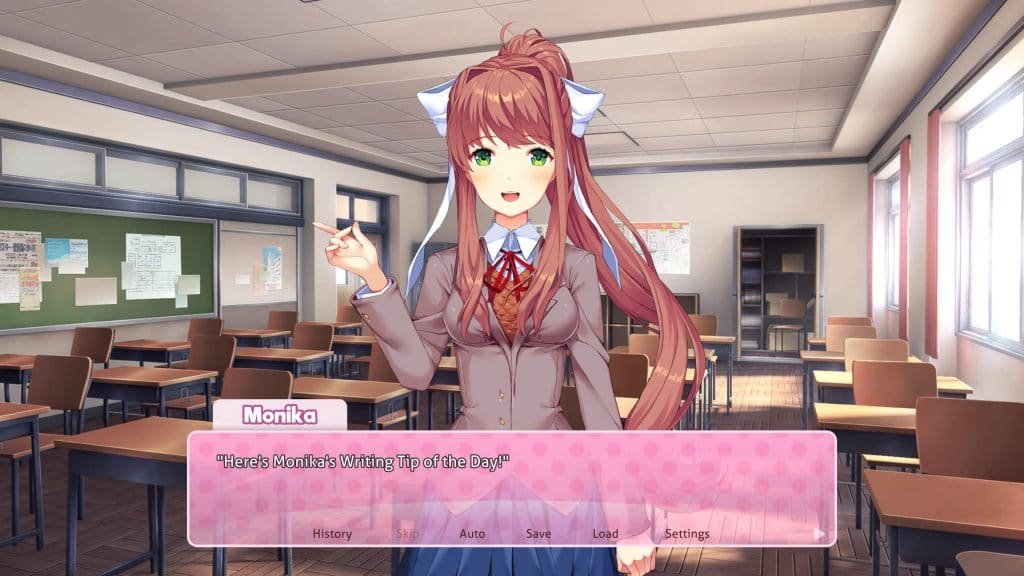
Doki Doki Literature Club Plus! is the definitive edition of a subversive masterpiece. Beyond the horror elements that earn it an “M” rating, there is a sincere story about expressing oneself in a society that forces everyone to mask their flaws and bury their passions in order to fit in. It's equal parts heartfelt and heartbreaking, and a unique experience that will forever change how you view dating sim mechanics in video games. Whether you’re a newcomer or have been in the trenches with the girls before, there is more than enough content to justify the $15 digital price.

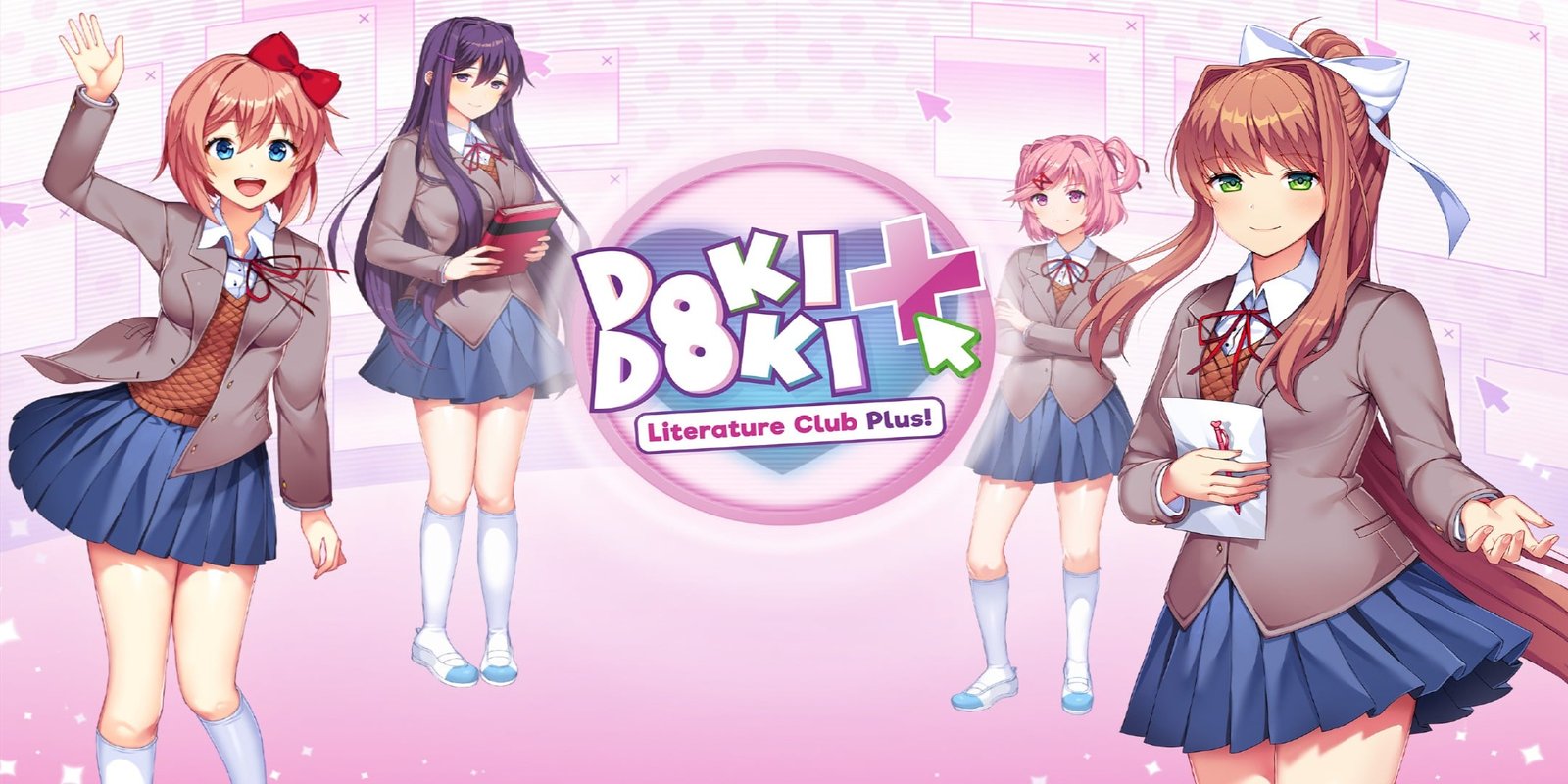
As someone who played Doki Doki on a PC, I have an obvious question that may arise from my ignorance of the PS5 system. There were things about the PC version that I do not believe can be duplicated on a console. (I’m being intentionally vague to as not, as you stated, “be a disservice to anyone who hasn’t experienced the story.”) Is it possible to explain how the PS5 version handles this without giving anything away?
[…] Visual Novels, Inanimate Objects Come to Life, and Ben Starr […]